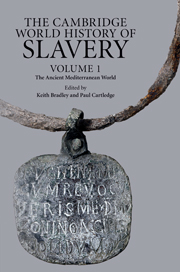Book contents
- Frontmatter
- Contents
- Series editors' introduction
- List of figures
- Acknowledgements
- Introduction
- 1 Slavery in the ancient Near East
- 2 Slaves in Greek literary culture
- 3 Classical Athens
- 4 The Helots: a contemporary review
- 5 Slavery and economy in the Greek world
- 6 The slave supply in classical Greece
- 7 Slavery and the Greek family
- 8 Resistance among chattel slaves in the classical Greek world
- 9 Archaeology and Greek slavery
- 10 Slavery in the Hellenistic world
- 11 Slavery and Roman literary culture
- 12 Slavery in the Roman Republic
- 13 Slavery Under the Principate
- 14 The Roman slave supply
- 15 Slave labour and Roman society
- 16 Slavery and the Roman family
- 17 Resisting slavery at Rome
- 18 Slavery and Roman material culture
- 19 Slavery and Roman law
- 20 Slavery and the Jews
- 21 Slavery and the rise of Christianity
- 22 Slavery in the late Roman world
- Bibliography
- General index
- Index of ancient passages cited
- Index of inscriptions and papyri
- Index of Jewish and Christian Literature Cited
21 - Slavery and the rise of Christianity
Published online by Cambridge University Press: 28 September 2011
- Frontmatter
- Contents
- Series editors' introduction
- List of figures
- Acknowledgements
- Introduction
- 1 Slavery in the ancient Near East
- 2 Slaves in Greek literary culture
- 3 Classical Athens
- 4 The Helots: a contemporary review
- 5 Slavery and economy in the Greek world
- 6 The slave supply in classical Greece
- 7 Slavery and the Greek family
- 8 Resistance among chattel slaves in the classical Greek world
- 9 Archaeology and Greek slavery
- 10 Slavery in the Hellenistic world
- 11 Slavery and Roman literary culture
- 12 Slavery in the Roman Republic
- 13 Slavery Under the Principate
- 14 The Roman slave supply
- 15 Slave labour and Roman society
- 16 Slavery and the Roman family
- 17 Resisting slavery at Rome
- 18 Slavery and Roman material culture
- 19 Slavery and Roman law
- 20 Slavery and the Jews
- 21 Slavery and the rise of Christianity
- 22 Slavery in the late Roman world
- Bibliography
- General index
- Index of ancient passages cited
- Index of inscriptions and papyri
- Index of Jewish and Christian Literature Cited
Summary
Slavery was legal and common in the Jewish, Greek and Roman societies in which Christianity emerged and developed. Christians, who debated every aspect of theology, Christology and ecclesiology, likewise debated the nature of slaves and slavery. Although the words of some ancient Christian can be summoned to rebut almost any generalisation about the ancient Church and slavery, Christians, who frequently insisted that the distinction between free and slave was of no importance in the eyes of God, typically supported the institution of slavery. Slaveholding practices affected the lives of individual Christians and insinuated themselves into ecclesiastical policy. After first analysing in this chapter slavery as root theological metaphor in early Christian theology, I consider next the range of ancient Christian attitudes towards slaves and slaveholding and the impact of Christianity on the institution itself, in particular whether Christianity had an ameliorating effect on the conduct of slaveholders or the lives of their slaves.
Jesus of Nazareth would have known that the Jewish national story highlighted a period of enslavement in Egypt that culminated in divinely inspired liberation. He would also have been aware that the Torah permitted and regulated slaveholding: a mythic heritage of enslavement and liberation did not motivate an abolitionist ideology. Practices of slaveholding among ancient Jews followed the contours of slaveholding practices in surrounding cultures, a pattern of assimilation that complicates any attempt to isolate distinctively Jewish elements in Jesus' sayings or in primitive Christian attitudes toward slavery. Philo Judaeus and Flavius Josephus report a possible exception.
- Type
- Chapter
- Information
- The Cambridge World History of Slavery , pp. 456 - 481Publisher: Cambridge University PressPrint publication year: 2011
- 7
- Cited by

